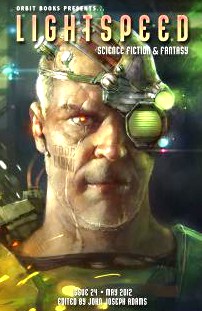“Nightside on Callisto” by Linda Nagata
“The Children of Hamelin” by Dale Bailey
“The Cross-Time Accountants Fail To Kill Hitler Because Chuck Berry Does The Twist” by C.C. Finlay
“Mother of All Russiya” by Melanie Rawn
Reviewed by Jo-Anne Odell
In Linda Nagata‘s “Nightside on Callisto,” Jayne is part of a four-person team dispatched to Callisto, one of Jupiter’s moons. Her goal is to establish an ice-mining station to feed the needs of a growing alliance, the Shell Cities. When she wakes to hear a faint whine, she knows something is wrong. The source of the problem is soon confirmed, when their shelter is torn apart. Their enemy, a thing called the Red, has infiltrated their mechanical aids. The mechs turn against them, and one of their teammates is killed. If the rest are to survive the hostile environment, they’ll need to take desperate measures.
The prose is clean and accessible, and the technological details are consistent and nicely thought-out. It’s the type of story that will appeal to readers of hard SF.
“The Children of Hamelin” by Dale Bailey tells us of a bereft father living in a world where the children have all disappeared. He meets a woman and shares his story with her, as she shares hers with him.
This is an angst tale, one of those where the character wanders about, emoting about his problem. It’s very nicely written. If you’re fond of them, you’ll like it. I admire the clear, evocative style.
In “The Cross-Time Accountants Fail To Kill Hitler Because Chuck Berry Does The Twist” by C.C. Finlay, Mabel has returned to the past, to Memphis in 1956. Retreating from a dystopic world, she’s not here on business. She’s come to see Chuck Berry sing. Unfortunately for her, a colleague has tracked her down, with other ideas. Mabel is an expert on the twentieth century, and her coworkers have spotted a chance to assassinate Hitler. They don’t get the opportunity. When the club is raided, she finds herself, a woman of color, facing one of the other realities of Memphis in 1956.
I really wanted to like this one. On first glance, it looked like fun, and heaven knows, some lighthearted material would be welcome. Unfortunately, I thought the story felt forced, as if the goal wasn’t the tale, but rather to fit in as many references as possible. Of course, it doesn’t help matters that not so long ago, The Help handled the same premise to stronger effect.
In the tenth century, Olga seeks to protect herself and her son in “Mother of All Russiya” by Melanie Rawn. To prevent others from trying to take the place of her unlamented husband, Olga plots revenge against those who’d murdered their Grand Prince. Her weapon of choice is magic, directed by her ingenuity, and wielded by Master Cheng, a eunuch from the orient. She succeeds in her initial plan, but destroys only part of the threat against her family. The next group to arrive is larger, better-armed, and more suspicious. It will take a more ingenious effort to remove them.
This is a flowing tale of a mother’s desire to save her son’s life and her family’s legacy. Though a fictional account, the story is based on the real history of Kyiv, now, of course, the capital city of Ukraine.
